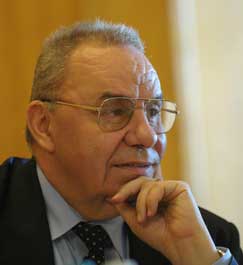This is not the title I though of initially for today’s column. It is the title of a book published in 2007 by the current Commissioner for Justice, Jacques Barrot, including a comment on the relationship between the French that had refused the Constitutional Treaty in 2005 and the United Europe.
This is not the title I though of initially for today’s column. It is the title of a book published in 2007 by the current Commissioner for Justice, Jacques Barrot, including a comment on the relationship between the French that had refused the Constitutional Treaty in 2005 and the United Europe.
I also chose this title because it is likely to define the views of Romanians regarding the European Union after the adherence to the European Union.
The last European Commission report on the justice in Romania has been commented upon in the country and abroad. I wrote about the report too, and I will not repeat the things written. But I think it would be useful to try some more general conclusions now, apart from the moment and the details of the text itself.
Romania's relationship with the institutional Europe is at its beginning, and any beginning is marked by smaller or greater mistakes. But Romania's relationship with the monitoring bodies of all kinds is longer. Basically, it started with the postcommunism. We have been monitored regarding an issue or another, in a period or another, by the Council of Europe, the IMF, NATO, the World Bank and the EU.
Always, the monitoring was regarded very seriously by the Romanians as well as by the politicians and analysts. They have enjoyed a certain presumption of seriousness that came from an area that I know not to be connected to the Balkan procedures that deform the reality. On the other hand, Romania depended in one way or another on the relationship with those institutions and the content of the monitoring reports have a serious practical impact: Shall we take a part as a loan? Do we raise the rating of our country? Are we or not in NATO and the EU?
However, we have to note that Romania was always outside the systems that monitored it. At that time, it was outside the EU or NATO and those were its first steps in a market economy that the IMF and the World Bank attempted to stimulate there. Now, things are about to change. WE HAVE BECOME A PART OF THE SYSTEM THAT MONITORS US. And the system is no longer an objective observer of what's going on here. He is directly interested in political developments in the country. The Europeans Populars, for example, will stimulate the Romanian Populars because they still want a massive and influential group in the Parliament in Brussels.
Although fully-fledged member of the EU, Romania is treated as if it were still at the door of the organization. Justice here is monitored rhythmically, while in Italy hundreds of lawsuits of corruption may be suspended overnight, without this leading to any European reaction. Are there good forever countries and countries in question forever? The statutes of the European organization don’t mention this.
The political changes in the European structures is not the ideal space for the political changes in the Romanian judicial structures. Here is an excerpt in connection to this situation that is part of a short and eloquent document, the declaration of the Romanian social-democrat group in the European Parliament: "In this context it is noteworthy that the EC wish to substitute the Romanian justice and to establish quantitative symbolical criteria for measuring the success of the fight against corruption is, in its turn, a form of bringing politics in this fight. This pressure, doubled by the TV-justice, cancels the presumption of innocence."
Unfortunately, the election years that we will come are to send increasingly truncated and partisan messages to and from Brussels. We will try to fight here in Bucharest, with our Brussels against their Brussels. And we will remain with a confusing and always monitoring picture. The famous and chronic Romanian political illness is able to divide the United Europe, in which we no longer know whether Freedom House identifies itself with "La Casa de la Libertá" or with "La Maison de la Liberté." Anyway, not with the Freedom House for now. Maybe only if we hired Daniel Morar in there...








